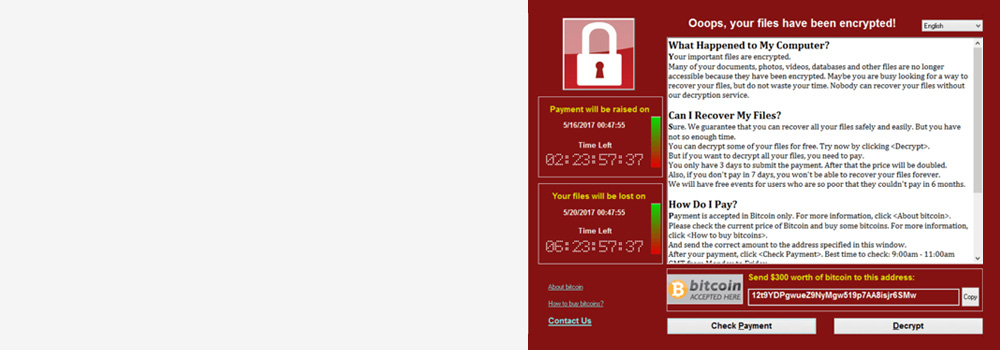Maidenhead Data Recovery – Forensic Ransomware Data Recovery Specialists
At Maidenhead Data Recovery, our Forensic Investigation Lab has over 25 years’ experience handling complex data recovery cases, including systems compromised by ransomware encryption. We provide professional recovery and forensic decryption services in Coventry and nationwide for all types of environments:
-
Laptops & Desktops (personal or corporate)
-
External Drives & Portable Media
-
RAID/NAS/SAN Servers (from 2-disk arrays to enterprise storage clusters)
-
Virtualised Environments (VMware, Hyper-V, Proxmox, etc.)
We specialise in recovering from leading ransomware families such as WannaCry, LockBit, REvil (Sodinokibi), Ryuk, Dharma, Maze, BlackCat/ALPHV, and many others.
Ransomware Scenarios We Resolve
-
Fully Encrypted File Systems – entire volumes locked by AES/RSA encryption
-
Partial Encryption – ransomware that encrypts only file headers or blocks
-
System Lockdowns – boot records, registry, or hypervisor-level hijacks
-
Double Extortion – files encrypted + exfiltration of sensitive data
-
Shadow Copy Deletion – ransomware wiping restore points to block rollback
Forensic Workflow & Decryption Process
When we receive a compromised device, we follow a structured, forensic-grade workflow:
-
Disk Imaging & Preservation – create sector-level forensic clones to prevent contamination.
-
Malware Identification – identify ransomware strain via binary signatures, file markers, ransom note metadata, and YARA rules.
-
Key Analysis – inspect registry, dropped executables, memory dumps, and volatile artefacts for hard-coded or cached encryption keys.
-
Controlled Sandbox Testing – run the ransomware in an isolated lab to reverse-engineer encryption routines and key generation algorithms.
-
Recovery Execution – depending on findings, apply one or more of the following techniques.
25 Ransomware Decryption & Recovery Techniques
-
Static Signature Analysis – identify ransomware family by ransom note, file extension, or binary hash to check for known decryptors.
-
Memory Dump Key Extraction – capture RAM during infection to extract AES session keys before system reboot.
-
Shadow Copy Restoration – attempt to restore Volume Shadow Copies (if not fully deleted or only hidden).
-
System Restore Point Reversion – recover registry and system state to bypass startup ransomware loaders.
-
Master Boot Record Repair – restore overwritten or corrupted boot sectors to regain OS access.
-
Weak PRNG Exploitation – some ransomware uses poor pseudo-random number generators; we brute-force seed values to regenerate keys.
-
RSA Key Flaw Analysis – in certain strains, improper RSA key implementation allows partial reconstruction of private keys.
-
File Carving & Partial Recovery – recover unencrypted file fragments from disk slack space and unallocated sectors.
-
File Header Repair – in partial-encryption attacks, restore file headers and rebuild usable data from unaffected sections.
-
Brute-Force Key Search (GPU-accelerated) – multi-GPU rigs attempt password/key-space brute force within feasible ranges.
-
Known-Plaintext Attack – exploit predictable content (e.g., JPEG headers, Office XML structures) to deduce key streams.
-
Ransomware Flaw Reverse Engineering – decompile ransomware binaries to identify hardcoded master keys or logic errors.
-
Corrupt Encryption Rollback – if encryption was interrupted, reconstruct intact files from transaction logs or backup journals.
-
Alternative Storage Recovery – locate previous file versions in OneDrive, Dropbox, Google Drive, or local sync caches.
-
Email & Cloud Forensics – recover attachments from cached mail stores or browser caches untouched by ransomware.
-
Network Share Recovery – restore shadow copies or snapshots from NAS/RAID servers not directly attacked.
-
NAS Vendor Snapshots – leverage Synology/QNAP/NetApp snapshot technologies where ransomware failed to purge them.
-
VSS Exploitation Tools – advanced forensic tools that locate and extract residual shadow copy blocks.
-
Undo Logs in Databases – recover transactional data from SQL/Oracle undo segments unaffected by encryption.
-
ReFS Integrity Streams (Windows Servers) – reconstruct unencrypted segments using built-in metadata integrity.
-
Apple Time Machine Snapshots – access local TM backups on macOS before ransomware attempted to erase them.
-
EXT4 Journal Replay (Linux Servers) – replay journal transactions to rebuild pre-encryption file states.
-
Virtual Machine Rollback – mount snapshots/checkpoints in VMware, Hyper-V, or Proxmox.
-
Negotiation Support – if decryption requires direct negotiation with attackers, provide forensic logging, escrow, and verification.
-
Hybrid Recovery Approach – combine partial decrypts, carved fragments, and rebuilt metadata for maximum usable recovery.
Why Choose Maidenhead Data Recovery
-
25 years of forensic expertise in advanced, multi-layered recovery.
-
Specialist in APFS, HFS+, NTFS, EXT4, ReFS, ZFS—file systems often targeted by ransomware.
-
Enterprise RAID/NAS recovery experience with parity rebuilds after ransomware + drive failure.
-
Advanced forensic tooling: multi-GPU decryption rigs, PC-3000, EnCase, FTK, IDA Pro for malware reverse engineering.
-
Critical Service available – 24–48 hour turnaround for urgent business cases.
Contact Maidenhead Data Recovery Today
If your systems are compromised by ransomware—whether personal laptop or enterprise RAID server—contact our forensic lab immediately. We provide free diagnostics, fast response, and transparent recovery options.


